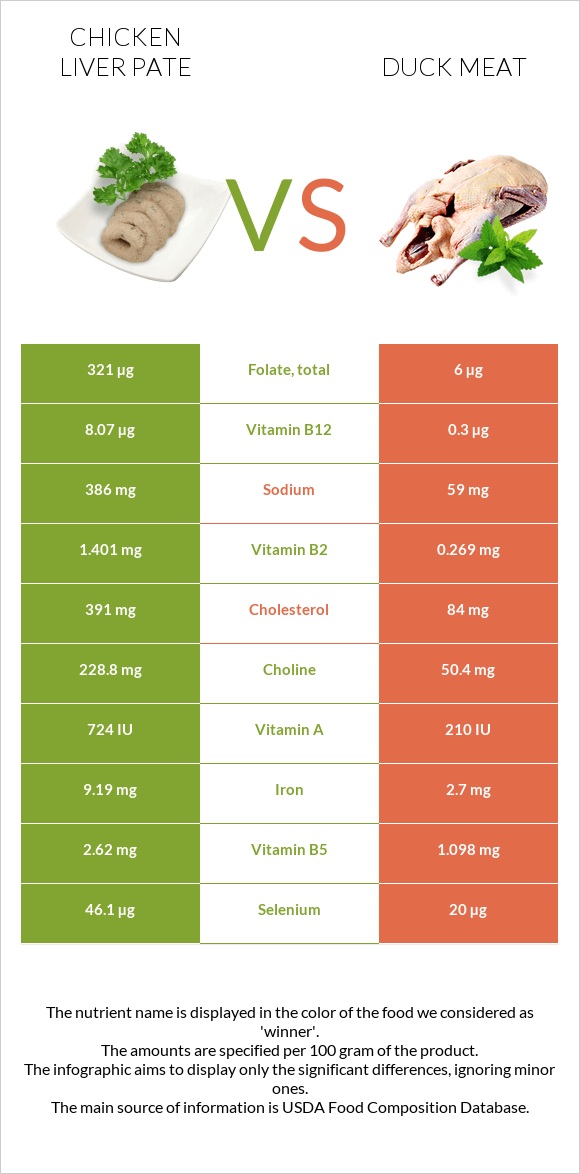Chicken liver pate vs. Duck meat — In-Depth Nutrition Comparison
Compare
Summary of differences between chicken liver pate and duck meat
- The amount of vitamin B12, vitamin B2, iron, folate, selenium, choline, vitamin B5, and vitamin B3 in chicken liver pate is higher than in duck meat.
- Chicken liver pate covers your daily need for vitamin B12, 324% more than duck meat.
- Chicken liver pate contains 54 times more folate than duck meat. While chicken liver pate contains 321µg of folate, duck meat contains only 6µg.
- The amount of cholesterol in duck meat is lower.
These are the specific foods used in this comparison Pate, chicken liver, canned and Duck, domesticated, meat, and skin, cooked, roasted.
Infographic

Infographic link
Mineral Comparison
Mineral comparison score is based on the number of minerals by which one or the other food is richer. The "coverage" charts below show how much of the daily needs can be covered by 300 grams of the food.
| Contains more IronIron | +240.4% |
| Contains more ZincZinc | +15.1% |
| Contains more PhosphorusPhosphorus | +12.2% |
| Contains more ManganeseManganese | +752.6% |
| Contains more SeleniumSelenium | +130.5% |
| Contains more MagnesiumMagnesium | +23.1% |
| Contains more PotassiumPotassium | +114.7% |
| Contains more CopperCopper | +26.1% |
| Contains less SodiumSodium | -84.7% |
Vitamin Comparison
Vitamin comparison score is based on the number of vitamins by which one or the other food is richer. The "coverage" charts below show how much of the daily needs can be covered by 300 grams of the food.
| Contains more Vitamin CVitamin C | +∞% |
| Contains more Vitamin AVitamin A | +244.4% |
| Contains more Vitamin EVitamin E | +40% |
| Contains more Vitamin B2Vitamin B2 | +420.8% |
| Contains more Vitamin B3Vitamin B3 | +55.8% |
| Contains more Vitamin B5Vitamin B5 | +138.6% |
| Contains more Vitamin B6Vitamin B6 | +44.4% |
| Contains more Vitamin B12Vitamin B12 | +2590% |
| Contains more FolateFolate | +5250% |
| Contains more Vitamin DVitamin D | +∞% |
| Contains more Vitamin B1Vitamin B1 | +234.6% |
| Contains more Vitamin KVitamin K | +∞% |
All nutrients comparison - raw data values
| Nutrient |  |
 |
DV% diff. |
| Vitamin B12 | 8.07µg | 0.3µg | 324% |
| Cholesterol | 391mg | 84mg | 102% |
| Vitamin B2 | 1.401mg | 0.269mg | 87% |
| Iron | 9.19mg | 2.7mg | 81% |
| Folate | 321µg | 6µg | 79% |
| Selenium | 46.1µg | 20µg | 47% |
| Choline | 228.8mg | 50.4mg | 32% |
| Vitamin B5 | 2.62mg | 1.098mg | 30% |
| Saturated fat | 4g | 9.67g | 26% |
| Fats | 13.1g | 28.35g | 23% |
| Monounsaturated fat | 5.28g | 12.9g | 19% |
| Vitamin A | 217µg | 63µg | 17% |
| Vitamin B3 | 7.517mg | 4.825mg | 17% |
| Sodium | 386mg | 59mg | 14% |
| Protein | 13.45g | 18.99g | 11% |
| Vitamin C | 10mg | 0mg | 11% |
| Vitamin B1 | 0.052mg | 0.174mg | 10% |
| Polyunsaturated fat | 2.46g | 3.65g | 8% |
| Calories | 201kcal | 337kcal | 7% |
| Manganese | 0.162mg | 0.019mg | 6% |
| Vitamin B6 | 0.26mg | 0.18mg | 6% |
| Copper | 0.18mg | 0.227mg | 5% |
| Vitamin K | 0µg | 5.1µg | 4% |
| Potassium | 95mg | 204mg | 3% |
| Zinc | 2.14mg | 1.86mg | 3% |
| Phosphorus | 175mg | 156mg | 3% |
| Carbs | 6.55g | 0g | 2% |
| Vitamin E | 0.98mg | 0.7mg | 2% |
| Magnesium | 13mg | 16mg | 1% |
| Vitamin D | 0µg | 0.1µg | 1% |
| Net carbs | 6.55g | 0g | N/A |
| Vitamin D | 0 IU | 3 IU | 0% |
| Calcium | 10mg | 11mg | 0% |
| Tryptophan | 0.195mg | 0.232mg | 0% |
| Threonine | 0.601mg | 0.773mg | 0% |
| Isoleucine | 0.735mg | 0.872mg | 0% |
| Leucine | 1.196mg | 1.465mg | 0% |
| Lysine | 0.953mg | 1.486mg | 0% |
| Methionine | 0.34mg | 0.475mg | 0% |
| Phenylalanine | 0.694mg | 0.752mg | 0% |
| Valine | 0.863mg | 0.938mg | 0% |
| Histidine | 0.347mg | 0.462mg | 0% |
Macronutrient Comparison
Macronutrient breakdown side-by-side comparison
Protein:
13.45 g
Fats:
13.1 g
Carbs:
6.55 g
Water:
65.64 g
Other:
1.26 g
Protein:
18.99 g
Fats:
28.35 g
Carbs:
0 g
Water:
51.84 g
Other:
0.82 g
| Contains more CarbsCarbs | +∞% |
| Contains more WaterWater | +26.6% |
| Contains more OtherOther | +53.7% |
| Contains more ProteinProtein | +41.2% |
| Contains more FatsFats | +116.4% |
Fat Type Comparison
Fat type breakdown side-by-side comparison
Saturated fat:
Sat. Fat
4 g
Monounsaturated fat:
Mono. Fat
5.28 g
Polyunsaturated fat:
Poly. Fat
2.46 g
Saturated fat:
Sat. Fat
9.67 g
Monounsaturated fat:
Mono. Fat
12.9 g
Polyunsaturated fat:
Poly. Fat
3.65 g
| Contains less Sat. FatSaturated fat | -58.6% |
| Contains more Mono. FatMonounsaturated fat | +144.3% |
| Contains more Poly. FatPolyunsaturated fat | +48.4% |





